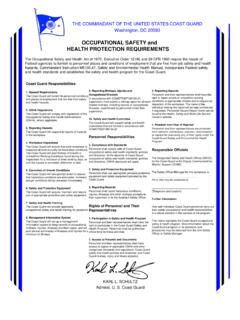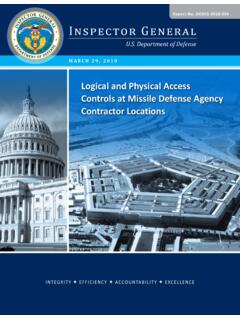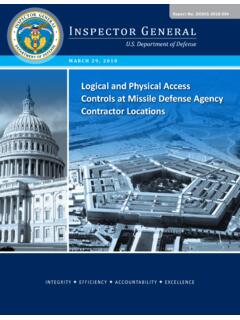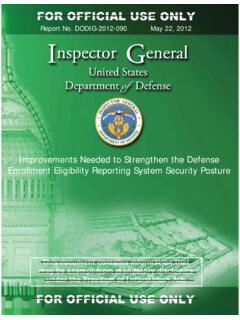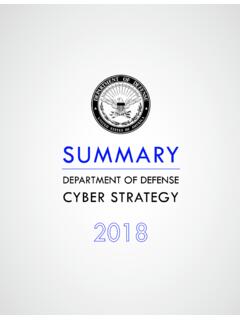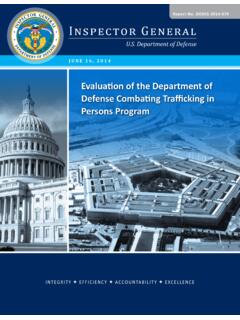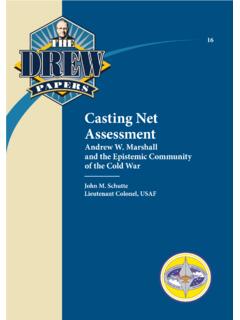Transcription of Understanding and Mitigating Russian State- Sponsored ...
1 To report suspicious or criminal activity related to information found in this Joint Cybersecurity Advisory, contact your local FBI field office at , or the FBI s 24/7 Cyber Watch (CyWatch) at (855) 292-3937 or by e-mail at When available, please include the following information regarding the incident: date, time, and location of the incident; type of activity; number of people affected; type of equipment used for the activity; the name of the submitting company or organization; and a designated point of contact. To request incident response resources or technical assistance related to these threats, contact CISA at For NSA client requirements or general cybersecurity inquiries, contact the Cybersecurity Requirements Center at 410-854-4200 or This document is marked TLP:WHITE. Disclosure is not limited. Sources may use TLP:WHITE when information carries minimal or no foreseeable risk of misuse, in accordance with applicable rules and procedures for public release.
2 Subject to standard copyright rules, TLP:WHITE information may be distributed without restriction. For more information on the Traffic Light Protocol, see TLP:WHITE Product ID: A22-011A January 11, 2022 Co-Authored by: TLP:WHITE Understanding and Mitigating Russian State- Sponsored Cyber Threats to Critical Infrastructure SUMMARY This joint Cybersecurity Advisory (CSA) authored by the Cybersecurity and Infrastructure Security Agency (CISA), Federal Bureau of Investigation (FBI), and National Security Agency (NSA) is part of our continuing cybersecurity mission to warn organizations of cyber threats and help the cybersecurity community reduce the risk presented by these threats. This CSA provides an overview of Russian state- Sponsored cyber operations; commonly observed tactics, techniques, and procedures (TTPs); detection actions; incident response guidance; and mitigations. This overview is intended to help the cybersecurity community reduce the risk presented by these threats.
3 CISA, the FBI, and NSA encourage the cybersecurity community especially critical infrastructure network defenders to adopt a heightened state of awareness and to conduct proactive threat hunting, as outlined in the Detection section. Additionally, CISA, the FBI, and NSA strongly urge network defenders to implement the recommendations listed below and detailed in the Mitigations section. These mitigations will help organizations improve their functional resilience by reducing the risk of compromise or severe business degradation. Actions critical infrastructure organizations should implement to immediately strengthen their cyber posture. Patch all systems. Prioritize patching known exploited vulnerabilities. Implement multi-factor authentication. Use antivirus software. Develop internal contact lists and surge support. CISA | FBI | NSA TLP:WHITE Page 2 of 12 | Product ID: A22-011A TLP:WHITE 1. Be prepared. Confirm reporting processes and minimize personnel gaps in IT/OT security coverage.
4 Create, maintain, and exercise a cyber incident response plan, resilience plan, and continuity of operations plan so that critical functions and operations can be kept running if technology systems are disrupted or need to be taken offline. 2. Enhance your organization s cyber posture. Follow best practices for identity and access management, protective controls and architecture, and vulnerability and configuration management. 3. Increase organizational vigilance. Stay current on reporting on this threat. Subscribe to CISA s mailing list and feeds to receive notifications when CISA releases information about a security topic or threat. CISA, the FBI, and NSA encourage critical infrastructure organization leaders to review CISA Insights: Preparing for and Mitigating Cyber Threats for information on reducing cyber threats to their organization. TECHNICAL DETAILS Note: this advisory uses the MITRE ATT&CK for Enterprise framework, version 10. See the ATT&CK for Enterprise for all referenced threat actor tactics and techniques.
5 Historically, Russian state- Sponsored advanced persistent threat (APT) actors have used common but effective tactics including spearphishing, brute force, and exploiting known vulnerabilities against accounts and networks with weak security to gain initial access to target networks. Vulnerabilities known to be exploited by Russian state- Sponsored APT actors for initial access include: CVE-2018-13379 FortiGate VPNs CVE-2019-1653 Cisco router CVE-2019-2725 Oracle WebLogic Server CVE-2019-7609 Kibana CVE-2019-9670 Zimbra software CVE-2019-10149 Exim Simple Mail Transfer Protocol CVE-2019-11510 Pulse Secure CVE-2019-19781 Citrix CVE-2020-0688 Microsoft Exchange CVE-2020-4006 VMWare (note: this was a zero-day at time.) CVE-2020-5902 F5 Big-IP CVE-2020-14882 Oracle WebLogic CVE-2021-26855 Microsoft Exchange (Note: this vulnerability is frequently observed used in conjunction with CVE-2021-26857, CVE-2021-26858, and CVE-2021-27065) Russian state- Sponsored APT actors have also demonstrated sophisticated tradecraft and cyber capabilities by compromising third-party infrastructure, compromising third-party software, or developing and deploying custom malware.
6 The actors have also demonstrated the ability to maintain persistent, undetected, long-term access in compromised environments including cloud environments by using legitimate credentials. CISA | FBI | NSA TLP:WHITE Page 3 of 12 | Product ID: A22-011A TLP:WHITE In some cases, Russian state- Sponsored cyber operations against critical infrastructure organizations have specifically targeted operational technology (OT)/industrial control systems (ICS) networks with destructive malware. See the following advisories and alerts for information on historical Russian state- Sponsored cyber-intrusion campaigns and customized malware that have targeted ICS: ICS Advisory ICS Focused Malware Havex ICS Alert Ongoing Sophisticated Malware Campaign Compromising ICS (Update E) ICS Alert Cyber-Attack Against Ukrainian Critical Infrastructure Technical Alert CrashOverride Malware CISA MAR HatMan: Safety System Targeted Malware (Update B) CISA ICS Advisory Schneider Electric Triconex Tricon (Update B) Russian state- Sponsored APT actors have used sophisticated cyber capabilities to target a variety of and international critical infrastructure organizations, including those in the Defense Industrial Base as well as the Healthcare and Public Health, Energy, Telecommunications, and Government Facilities Sectors.
7 High-profile cyber activity publicly attributed to Russian state- Sponsored APT actors by government reporting and legal actions includes: Russian state- Sponsored APT actors targeting state, local, tribal, and territorial (SLTT) governments and aviation networks, September 2020, through at least December 2020. Russian state- Sponsored APT actors targeted dozens of SLTT government and aviation networks. The actors successfully compromised networks and exfiltrated data from multiple victims. Russian state- Sponsored APT actors global Energy Sector intrusion campaign, 2011 to 2018. These Russian state- Sponsored APT actors conducted a multi-stage intrusion campaign in which they gained remote access to and international Energy Sector networks, deployed ICS-focused malware, and collected and exfiltrated enterprise and ICS-related data. Russian state- Sponsored APT actors campaign against Ukrainian critical infrastructure, 2015 and 2016. Russian state- Sponsored APT actors conducted a cyberattack against Ukrainian energy distribution companies, leading to multiple companies experiencing unplanned power outages in December 2015.
8 The actors deployed BlackEnergy malware to steal user credentials and used its destructive malware component, KillDisk, to make infected computers inoperable. In 2016, these actors conducted a cyber-intrusion campaign against a Ukrainian electrical transmission company and deployed CrashOverride malware specifically designed to attack power grids. For more information on recent and historical Russian state- Sponsored malicious cyber activity, see the referenced products below or Joint FBI-DHS-CISA CSA Russian Foreign Intelligence Service (SVR) Cyber Operations: Trends and Best Practices for Network Defenders Joint NSA-FBI-CISA CSA Russian GRU Conducting Global Brute Force Campaign to Compromise Enterprise and Cloud Environments CISA | FBI | NSA TLP:WHITE Page 4 of 12 | Product ID: A22-011A TLP:WHITE Joint FBI-CISA CSA Russian State- Sponsored Advanced Persistent Threat Actor Compromises Government Targets Joint CISA-FBI CSA APT Actors Chaining Vulnerabilities against SLTT, Critical Infrastructure, and Elections Organizations CISA s webpage Remediating Networks Affected by the SolarWinds and Active Directory/M365 Compromise CISA Alert Russian Government Cyber Activity Targeting Energy Sector and Other Critical Infrastructure Sectors CISA ICS.
9 Alert Cyber-Attack Against Ukrainian Critical Infrastructure Table 1 provides common, publicly known TTPs employed by Russian state- Sponsored APT actors, which map to the MITRE ATT&CK for Enterprise framework, version 10. Note: these lists are not intended to be all inclusive. Russian state- Sponsored actors have modified their TTPs before based on public reporting.[1] Therefore, CISA, the FBI, and NSA anticipate the Russian state- Sponsored actors may modify their TTPs as they deem necessary to reduce their risk of detection. Table 1: Common Tactics and Techniques Employed by Russian State- Sponsored APT Actors Tactic Technique Procedure Reconnaissance [TA0043] Active Scanning: Vulnerability Scanning [ ] Russian state- Sponsored APT actors have performed large-scale scans in an attempt to find vulnerable servers. Phishing for Information [T1598] Russian state- Sponsored APT actors have conducted spearphishing campaigns to gain credentials of target networks.
10 Resource Development [TA0042] Develop Capabilities: Malware [ ] Russian state- Sponsored APT actors have developed and deployed malware, including ICS-focused destructive malware. Initial Access [TA0001] Exploit Public Facing Applications [T1190] Russian state- Sponsored APT actors use publicly known vulnerabilities, as well as zero-days, in internet-facing systems to gain access to networks. Supply Chain Compromise: Compromise Software Supply Chain [ ] Russian state- Sponsored APT actors have gained initial access to victim organizations by compromising trusted third-party software. Notable incidents include accounting software and SolarWinds Orion. Execution [TA0002] Command and Scripting Interpreter: PowerShell [ ] and Russian state- Sponsored APT actors have used to execute commands on remote machines. They have also used PowerShell to create new tasks on remote machines, CISA | FBI | NSA TLP:WHITE Page 5 of 12 | Product ID: A22-011A TLP:WHITE Tactic Technique Procedure Windows Command Shell [ ] identify configuration settings, exfiltrate data, and to execute other commands.
